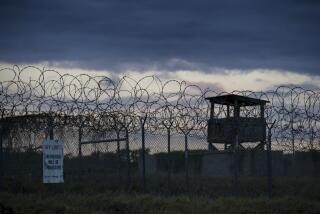A quiet night, until agents saw Shahzad’s name
- Share via
Reporting from Washington — Monday was just another night at the National Targeting Center in northern Virginia, where federal Customs and Border Protection agents spend hour after grueling hour on the necessary drudgery of comparing names on airline passenger manifests to names on terrorism watch lists.
Then, 40 minutes into the 10 p.m. shift, lightening struck. Officer Dan Donahue, on temporary detail from Detroit, noticed the name of Times Square bombing suspect Faisal Shahzad on a list of passengers seated on an Emirates flight heading to Dubai out of New York’s JFK airport. The jetliner was due to depart in 20 minutes.
The name was fresh in his mind. His watch commander, Petra Horne, had mentioned it in a briefing. Donahue stared down at his computer screen. The identifying information matched. “I didn’t have any doubts,” he said later.
Calls were made to New York. Minutes later, a calm and emotionless Shahzad was telling Customs and Border Protection Officer Robert McConkie that he “wondered what took us so long,” the officer recalled in an interview Friday.
Donahue’s small but consequential act — matching a name on two lists — averted what might have been an embarrassment for U.S. law enforcement and the Obama administration. Instead of questions about how Shahzad got away, federal officials now are able to tout his quick capture and the intelligence bonanza his interrogation has generated.
Critics have suggested that counter-terrorism officials should have detected Shahzad’s activities in Pakistan, and questioned how he was able to buy a ticket and board the plane despite being placed on the no-fly list.
But few have criticized the ultimate result: 53 hours after the bomb was noticed, Shahzad was in custody.
The agents themselves say — of course — that they were just doing their job.
“This is something I’ve been doing for over 22 years,” said Horne, a mother of two teenage daughters who started her career in Texas.
Donahue said he “didn’t have time to think, really.”
“It all fell back on our experience and our training,” he said. “It was a collective team effort.”
He is on temporary assignment from Detroit, where he’s worked the airport and the Canadian border. His family is still there, and he expects to return this summer.
When the officers realized they’d flagged the Times Square bombing suspect, “We didn’t have really any time to think about anything, other than, boom, boom, boom, this is what you do,” Horne said. “You gotta pick up the phone, you coordinate with JFK…. You just go into motion. It’s just automatic.”
When JFK got the call, Sgt. Paul Casquarelli, the supervisor, ordered the plane to hold and went with McConkie to the gate.
“We asked them to page him over the plane’s intercom system and have him come to the door of the aircraft,” Casquarelli said. “A few minutes later Faisal Shahzad showed up at the door of the aircraft with his carry-on bag, and we asked him to come off the plane.”
McConkie handcuffed him and patted him down.
“He had a very calm demeanor about him, showed absolutely no emotion,” McConkie said. “He didn’t seem scared.”
In the 45 minutes before the FBI arrived, Shahzad said nothing about the Times Square bomb, McConkie said.
“As I was escorting him down through the main terminal, he turned to me and asked me who I was, who I was with,” McConkie said. “‘Are you FBI, are you NYPD?’”
No, McConkie replied: Customs and Border Protection.
“He said he was expecting us, and wondered what took so long.”
More to Read
Sign up for Essential California
The most important California stories and recommendations in your inbox every morning.
You may occasionally receive promotional content from the Los Angeles Times.











